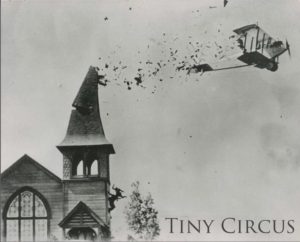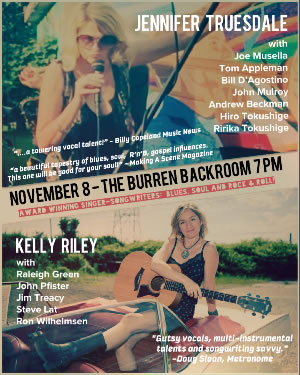 Tiny Circus just released their new audacious eponymous debut album. This work shines in each track, especially when they incorporate an aggression not always found in their jazz world. With spark in their melodic instruments and kick in many of their grooves, Tiny Circus plays jazz in their own way, and it will work well for plenty of listeners too.
Tiny Circus just released their new audacious eponymous debut album. This work shines in each track, especially when they incorporate an aggression not always found in their jazz world. With spark in their melodic instruments and kick in many of their grooves, Tiny Circus plays jazz in their own way, and it will work well for plenty of listeners too.
Opening track “Toe Work” begins with a self-restrained, stop and go groove. Sprinkled over that intriguing sound are brief hits of keyboards and saxophone. A gentle up and down bounce groove keeps the listener wondering how the band will expand on their theme. The basic vertical stop and go is soon surrounded with busy drum work that makes one picture the very busy drumsticks and the hands holding them.
“Running On Glass” begin with bursts of drums, a mellifluous saxophone line, and before you know it, an entire combo is racing, swinging around this groove. Unusual patterns emerge as these instrumentalists race together in short sprints, suggesting, as the title says, they are running atop a brittle surface that might collapse underneath them at any moments, this urgency its most enjoyable point. Good musicians trying to inject as much into their zippy lines before sprinting again.
“Open Air,” a dreamy sonic landscape of saxophone breezes, floats by like a hovercraft, never touching the ground, never stopping either. This brief number features ocean wave sound effects as well as a playback of a family vacation conversation. It makes for a good change of pace for Tiny Circus as well as a neat intro into the next track.
Another mellow saxophone picks up the pace a bit on “Ricky Spanish.” Here, the saxophone, blowing puffs of sweet melodic bliss, travel up tempo, widening, expanding. They presage the electronic keyboard melody that sails in a similar a fashion with its own tinkling timbre. Listening to the bits of rhythm section beneath informs that this combo knows how to fill space while intriguing with additional twists. Hits from the sticks and knobby pushes from the low end cycle in a way that makes possible the interchange of keys and sax as well as giving them some open spaces to hopscotch over. The tune succeeds because of how well the combo can fit bits and pieces of appealing notes into one larger artwork.
“Bubbles” lets guitarist Matthew Okun strut his stuff with swift, brief notes that come together so fast they form a melodic line. Just beneath that line lurks the mysterious low end throb of Devon Hurt. The hypnotic rhythm from those two create a stage for the bleating soul of Bousquet’s engaging sax line, a melodic push that motivates with a power inside of a smooth interval of notes.
Segue number “Parachute Malfunction’ showcases this outfit creating dramatic effects using just enough urgent notes, jumbled together, to create a sense of midair mishap. “Hatching” exudes charm in its introductory playfulness, a sax dancing loosely over a suave groove. It eventually evolves into a swaggering soulful groove with that Bousquet sax getting wilder, scorching. It’s that way the second half of this tune mirrors the first part with a zanier interpretation that makes each half sound fantastic in contrast to one another.
“Potential Projectile” has a spiraling missile sax phrase that likely gives this song its title. The lead up to that striking sound feels like a mellow contemplation of whether to launch. A knobby bass line funks around a jittery drum work out and a sax free for all. Together, the instruments successfully create the feel of a lively conversation, a communication between each player marvelously conveyed with artsy sprints from each.
“Reprieve” is a tossed salad of strong musical ideas. It moves from stomping horn and distorted guitar to a tender ripple of acoustic guitar. Every section the tune goes through manages to express a lot of deep emotion with quiet music. Though the piece is low key, its mild changes are plentiful and they keep the interest level high.
A playful tune, “Ya Think Ya Better Than Me”, finds the boys in a jaunty competition. Spiffy saxophone flourishes and an aggressive support unit work together like a Swiss watch. Every part comes into play just right, especially as that saxophone gets into a frenzied pace and the others have to support it with speedy resolve.
“Dwight Howard Deluxe” begins with subtle electric guitar and some dewy electric piano. It ends with a frenzied free form lead guitar. How it gets from point A to point B is a maze of intense experimentation. A saxophone bleating in the backdrop as an electric guitar screams its phrase in the forefront is a masterful use of contrast, forcing the listener to appreciate both at once.
Close out track “All We Do Is Riff” feels more melodic than a riff oriented tune. The top instrumental line is from a mellifluous sax. Beneath that sax reside the other instruments that hit flinty, accented notes. The bright and vibrant freeness of the sax is even shinier as it sails over a knobby low end, a bubbly piano line, and cool rhythm guitar playing. This technique works well here as it makes one appreciate the contrasting approaches of the top line and lower line of support.
Tiny Circus play a lot of marvelous melodies and they kick out a lot of hard, persistent grooves on this superb debut album. Their plethora of notes never fails to amaze with their shifting tempos and increasing dynamics. Keyboardist Ben Aiken, drummer Mike Dettorre, and bassist Devon Hurt round out this combo. Recorded at Maritime Music Studio in Peabody, Massachusetts with assistance from engineers Jake Pardee and Bradley Royds, this disc will be favored by jazz fans and probably fans of a few other genres.

